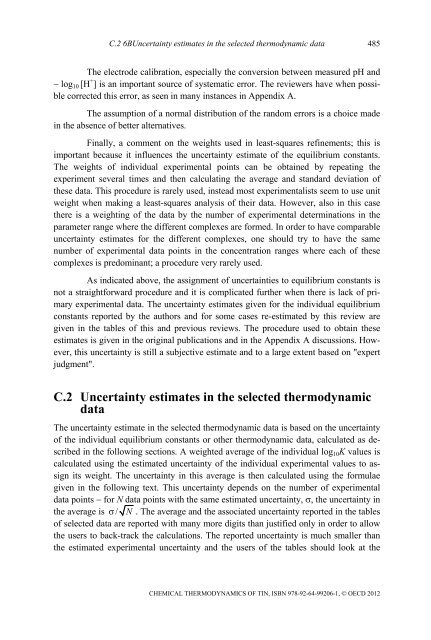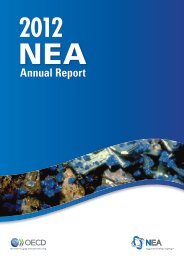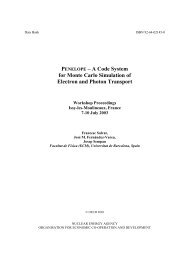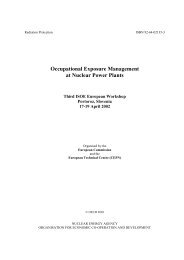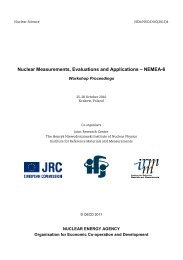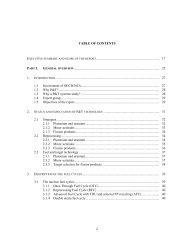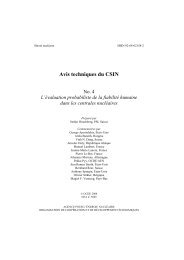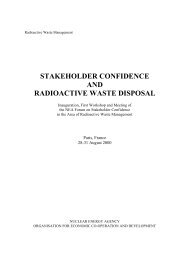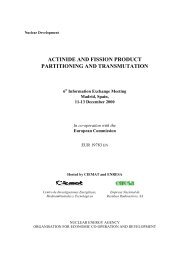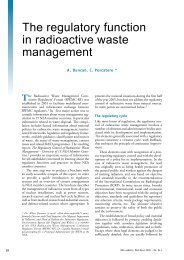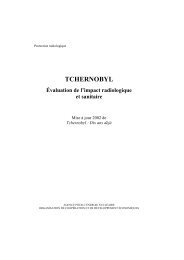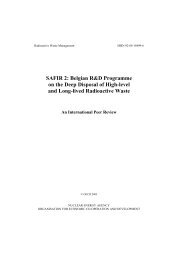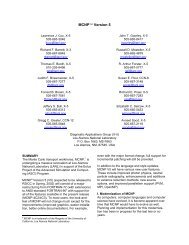- Page 3 and 4:
CHEMICAL THERMODYNAMICS OF TIN Hein
- Page 5:
CHEMICAL THERMODYNAMICS Vol. 1. Che
- Page 8 and 9:
vi Preface of the successive drafts
- Page 10 and 11:
viii Acknowledgements for peer revi
- Page 12 and 13:
x How to contact the NEA TDB Projec
- Page 14 and 15:
xii Contents III Selected tin data
- Page 16 and 17:
xiv Contents VIII.3 Aqueous halide
- Page 18 and 19:
xvi Contents B.1.3.2 Estimations ba
- Page 20 and 21:
xviii List of figures Figure VII-12
- Page 22 and 23:
xx List of figures Figure IX-3: Hea
- Page 24 and 25:
xxii List of figures Figure A-35: S
- Page 27 and 28:
List of tables Table II-1: Abbrevia
- Page 29 and 30:
List of tables xxvii Table VIII-1:
- Page 31 and 32:
List of tables xxix Table IX-4: Tab
- Page 33 and 34:
List of tables xxxi Table A-21: Sta
- Page 35 and 36:
List of tables xxxiii Table A-64: T
- Page 37:
Part 1 Introductory material
- Page 40 and 41:
4 I Introduction and Ti. In 1976, t
- Page 42 and 43:
6 I Introduction The present review
- Page 44 and 45:
8 I Introduction subjective choice
- Page 46 and 47:
10 II Standards, conventions and co
- Page 48 and 49:
12 II Standards, conventions and co
- Page 50 and 51:
14 II Standards, conventions and co
- Page 52 and 53:
16 II Standards, conventions and co
- Page 54 and 55:
18 II Standards, conventions and co
- Page 56 and 57:
20 II Standards, conventions and co
- Page 58 and 59:
22 II Standards, conventions and co
- Page 60 and 61:
24 II Standards, conventions and co
- Page 62 and 63:
26 II Standards, conventions and co
- Page 64 and 65:
28 II Standards, conventions and co
- Page 66 and 67:
30 II.3 II Standards, conventions a
- Page 68 and 69:
32 II Standards, conventions and co
- Page 70 and 71:
34 II Standards, conventions and co
- Page 72 and 73:
36 II Standards, conventions and co
- Page 74 and 75:
38 II Standards, conventions and co
- Page 77:
Part 2 Tables of selected data
- Page 80 and 81:
44 III Selected tin data Table III-
- Page 82 and 83:
46 III Selected tin data Table III-
- Page 84 and 85:
48 III Selected tin data Table III-
- Page 86 and 87:
50 III Selected tin data Species Re
- Page 88 and 89:
52 III Selected tin data Table III-
- Page 91 and 92:
Chapter IV Selected auxiliary data
- Page 93 and 94:
IV Selected auxiliary data 57 Table
- Page 95 and 96:
IV Selected auxiliary data 59 Table
- Page 97 and 98:
IV Selected auxiliary data 61 Table
- Page 99 and 100:
IV Selected auxiliary data 63 Table
- Page 101 and 102:
IV Selected auxiliary data 65 Table
- Page 103 and 104:
IV Selected auxiliary data 67 Table
- Page 105 and 106:
IV Selected auxiliary data 69 Table
- Page 107 and 108:
IV Selected auxiliary data 71 Table
- Page 109 and 110:
IV Selected auxiliary data 73 Table
- Page 111 and 112:
IV Selected auxiliary data 75 Speci
- Page 113 and 114:
IV Selected auxiliary data 77 Speci
- Page 115:
Part 3 Discussion of data selection
- Page 118 and 119:
82 V Elemental tin transition, call
- Page 120 and 121:
84 V Elemental tin ο Table V-3: Co
- Page 122 and 123:
86 V Elemental tin Table V-6: Param
- Page 125 and 126:
Chapter VI VI Simple tin aqua ionsE
- Page 127 and 128:
VI.2 Sn 2+ 91 at 24.5 °C in aqueou
- Page 129 and 130:
VI.2 Sn 2+ 93 Reference Table VI-1:
- Page 131 and 132:
VI.2 Sn 2+ 95 As only three data pa
- Page 133 and 134:
VI.2 Sn 2+ 97 Figures A-37 to A-40.
- Page 135 and 136:
VI.3 Sn 4+ 99 Sn 4+ + H 2 (g) Sn 2
- Page 137 and 138:
VI.3 Sn 4+ 101 (NH 4 ) 2 SnCl 6 see
- Page 139 and 140:
VI.3 Sn 4+ 103 Sn 4+ + H 2 (g) Sn
- Page 141:
VI.3 Sn 4+ 105 Figure VI-3: Modifie
- Page 144 and 145:
108 VII Tin oxygen and hydrogen com
- Page 146 and 147:
110 VII Tin oxygen and hydrogen com
- Page 148 and 149:
112 VII Tin oxygen and hydrogen com
- Page 150 and 151:
114 VII Tin oxygen and hydrogen com
- Page 152 and 153:
116 VII Tin oxygen and hydrogen com
- Page 154 and 155:
118 VII Tin oxygen and hydrogen com
- Page 156 and 157:
120 VII Tin oxygen and hydrogen com
- Page 158 and 159:
122 VII Tin oxygen and hydrogen com
- Page 160 and 161:
124 VII Tin oxygen and hydrogen com
- Page 162 and 163:
126 VII Tin oxygen and hydrogen com
- Page 164 and 165:
128 VII Tin oxygen and hydrogen com
- Page 166 and 167:
130 VII Tin oxygen and hydrogen com
- Page 168 and 169:
132 VII Tin oxygen and hydrogen com
- Page 170 and 171:
134 VII Tin oxygen and hydrogen com
- Page 172 and 173:
136 VII Tin oxygen and hydrogen com
- Page 174 and 175:
138 VIII Group 17 (halogen) compoun
- Page 176 and 177:
140 VIII Group 17 (halogen) compoun
- Page 178 and 179:
142 VIII Group 17 (halogen) compoun
- Page 180 and 181:
144 VIII Group 17 (halogen) compoun
- Page 182 and 183:
146 VIII Group 17 (halogen) compoun
- Page 184 and 185:
148 VIII Group 17 (halogen) compoun
- Page 186 and 187:
150 VIII Group 17 (halogen) compoun
- Page 188 and 189:
152 VIII Group 17 (halogen) compoun
- Page 190 and 191:
154 VIII Group 17 (halogen) compoun
- Page 192 and 193:
156 VIII Group 17 (halogen) compoun
- Page 194 and 195:
158 VIII Group 17 (halogen) compoun
- Page 196 and 197:
160 VIII Group 17 (halogen) compoun
- Page 198 and 199:
162 VIII Group 17 (halogen) compoun
- Page 200 and 201:
164 VIII Group 17 (halogen) compoun
- Page 202 and 203:
166 VIII Group 17 (halogen) compoun
- Page 204 and 205:
168 VIII Group 17 (halogen) compoun
- Page 206 and 207:
170 VIII Group 17 (halogen) compoun
- Page 208 and 209:
172 VIII Group 17 (halogen) compoun
- Page 210 and 211:
174 VIII Group 17 (halogen) compoun
- Page 212 and 213:
176 VIII Group 17 (halogen) compoun
- Page 214 and 215:
178 VIII Group 17 (halogen) compoun
- Page 216 and 217:
180 VIII Group 17 (halogen) compoun
- Page 218 and 219:
182 VIII Group 17 (halogen) compoun
- Page 220 and 221:
184 VIII Group 17 (halogen) compoun
- Page 222 and 223:
186 VIII Group 17 (halogen) compoun
- Page 224 and 225:
188 VIII Group 17 (halogen) compoun
- Page 226 and 227:
190 VIII Group 17 (halogen) compoun
- Page 228 and 229:
192 VIII Group 17 (halogen) compoun
- Page 230 and 231:
194 VIII Group 17 (halogen) compoun
- Page 232 and 233:
196 VIII Group 17 (halogen) compoun
- Page 234 and 235:
198 VIII Group 17 (halogen) compoun
- Page 236 and 237:
200 VIII Group 17 (halogen) compoun
- Page 238 and 239:
202 VIII Group 17 (halogen) compoun
- Page 240 and 241:
204 VIII Group 17 (halogen) compoun
- Page 242 and 243:
206 VIII Group 17 (halogen) compoun
- Page 245 and 246:
Chapter IX IX Group 16 compounds an
- Page 247 and 248:
IX.1 Sulfur compounds and complexes
- Page 249 and 250:
IX.1 Sulfur compounds and complexes
- Page 251 and 252:
IX.1 Sulfur compounds and complexes
- Page 253 and 254:
IX.1 Sulfur compounds and complexes
- Page 255 and 256:
IX.1 Sulfur compounds and complexes
- Page 257 and 258:
IX.1 Sulfur compounds and complexes
- Page 259 and 260:
IX.1 Sulfur compounds and complexes
- Page 261 and 262:
IX.1 Sulfur compounds and complexes
- Page 263 and 264:
IX.1 Sulfur compounds and complexes
- Page 265:
IX.1 Sulfur compounds and complexes
- Page 268 and 269:
232 X Group 15 compounds and comple
- Page 270 and 271:
234 X Group 15 compounds and comple
- Page 272 and 273:
236 X Group 15 compounds and comple
- Page 274 and 275:
238 X Group 15 compounds and comple
- Page 276 and 277:
240 X Group 15 compounds and comple
- Page 278 and 279:
242 X Group 15 compounds and comple
- Page 280 and 281:
244 X Group 15 compounds and comple
- Page 282 and 283:
246 X Group 15 compounds and comple
- Page 285 and 286:
Chapter XI XI Group 14 compounds an
- Page 287:
XI-1 Aqueous tin thiocyanato comple
- Page 291 and 292:
Appendix A Discussion of selected r
- Page 293 and 294:
A Discussion of selected references
- Page 295 and 296:
A Discussion of selected references
- Page 297 and 298:
A Discussion of selected references
- Page 299 and 300:
A Discussion of selected references
- Page 301 and 302:
A Discussion of selected references
- Page 303 and 304:
A Discussion of selected references
- Page 305 and 306:
A Discussion of selected references
- Page 307 and 308:
A Discussion of selected references
- Page 309 and 310:
A Discussion of selected references
- Page 311 and 312:
A Discussion of selected references
- Page 313 and 314:
A Discussion of selected references
- Page 315 and 316:
A Discussion of selected references
- Page 317 and 318:
A Discussion of selected references
- Page 319 and 320:
A Discussion of selected references
- Page 321 and 322:
A Discussion of selected references
- Page 323 and 324:
A Discussion of selected references
- Page 325 and 326:
A Discussion of selected references
- Page 327 and 328:
A Discussion of selected references
- Page 329 and 330:
A Discussion of selected references
- Page 331 and 332:
A Discussion of selected references
- Page 333 and 334:
A Discussion of selected references
- Page 335 and 336:
A Discussion of selected references
- Page 337 and 338:
A Discussion of selected references
- Page 339 and 340:
A Discussion of selected references
- Page 341 and 342:
A Discussion of selected references
- Page 343 and 344:
A Discussion of selected references
- Page 345 and 346:
A Discussion of selected references
- Page 347 and 348:
A Discussion of selected references
- Page 349 and 350:
A Discussion of selected references
- Page 351 and 352:
A Discussion of selected references
- Page 353 and 354:
A Discussion of selected references
- Page 355 and 356:
A Discussion of selected references
- Page 357 and 358:
A Discussion of selected references
- Page 359 and 360:
A Discussion of selected references
- Page 361 and 362:
A Discussion of selected references
- Page 363 and 364:
A Discussion of selected references
- Page 365 and 366:
A Discussion of selected references
- Page 367 and 368:
A Discussion of selected references
- Page 369 and 370:
A Discussion of selected references
- Page 371 and 372:
A Discussion of selected references
- Page 373 and 374:
A Discussion of selected references
- Page 375 and 376:
A Discussion of selected references
- Page 377 and 378:
A Discussion of selected references
- Page 379 and 380:
A Discussion of selected references
- Page 381 and 382:
A Discussion of selected references
- Page 383 and 384:
A Discussion of selected references
- Page 385 and 386:
A Discussion of selected references
- Page 387 and 388:
A Discussion of selected references
- Page 389 and 390:
A Discussion of selected references
- Page 391 and 392:
A Discussion of selected references
- Page 393 and 394:
A Discussion of selected references
- Page 395 and 396:
A Discussion of selected references
- Page 397 and 398:
A Discussion of selected references
- Page 399 and 400:
A Discussion of selected references
- Page 401 and 402:
A Discussion of selected references
- Page 403 and 404:
A Discussion of selected references
- Page 405 and 406:
A Discussion of selected references
- Page 407 and 408:
A Discussion of selected references
- Page 409 and 410:
A Discussion of selected references
- Page 411 and 412:
A Discussion of selected references
- Page 413 and 414:
A Discussion of selected references
- Page 415 and 416:
A Discussion of selected references
- Page 417 and 418:
A Discussion of selected references
- Page 419 and 420:
A Discussion of selected references
- Page 421 and 422:
A Discussion of selected references
- Page 423 and 424:
A Discussion of selected references
- Page 425 and 426:
A Discussion of selected references
- Page 427 and 428:
A Discussion of selected references
- Page 429 and 430:
A Discussion of selected references
- Page 431 and 432:
A Discussion of selected references
- Page 433 and 434:
A Discussion of selected references
- Page 435 and 436:
A Discussion of selected references
- Page 437 and 438:
A Discussion of selected references
- Page 439 and 440:
A Discussion of selected references
- Page 441 and 442:
A Discussion of selected references
- Page 443 and 444:
A Discussion of selected references
- Page 445 and 446:
A Discussion of selected references
- Page 447 and 448:
A Discussion of selected references
- Page 449 and 450:
A Discussion of selected references
- Page 451 and 452:
A Discussion of selected references
- Page 453 and 454:
A Discussion of selected references
- Page 455 and 456:
A Discussion of selected references
- Page 457 and 458:
A Discussion of selected references
- Page 459 and 460:
A Discussion of selected references
- Page 461 and 462:
A Discussion of selected references
- Page 463 and 464:
A Discussion of selected references
- Page 465 and 466:
A Discussion of selected references
- Page 467 and 468:
A Discussion of selected references
- Page 469 and 470: A Discussion of selected references
- Page 471 and 472: B Appendix B Ionic strength correct
- Page 473 and 474: B.1 2BThe specific ion interaction
- Page 475 and 476: B.1 2BThe specific ion interaction
- Page 477 and 478: B.1 2BThe specific ion interaction
- Page 479 and 480: B.1 2BThe specific ion interaction
- Page 481 and 482: B.1 2BThe specific ion interaction
- Page 483 and 484: B.1 2BThe specific ion interaction
- Page 485 and 486: B.3 4BTables of ion interaction coe
- Page 487 and 488: B.3 4BTables of ion interaction coe
- Page 489 and 490: B.3 4BTables of ion interaction coe
- Page 491 and 492: B.3 4BTables of ion interaction coe
- Page 493 and 494: B.3 4BTables of ion interaction coe
- Page 495 and 496: B.3 4BTables of ion interaction coe
- Page 497 and 498: B.3 4BTables of ion interaction coe
- Page 499 and 500: B.3 4BTables of ion interaction coe
- Page 501 and 502: B.3 4BTables of ion interaction coe
- Page 503 and 504: B.3 4BTables of ion interaction coe
- Page 505 and 506: B.3 4BTables of ion interaction coe
- Page 507 and 508: B.3 4BTables of ion interaction coe
- Page 509 and 510: B.3 4BTables of ion interaction coe
- Page 511 and 512: B.3 4BTables of ion interaction coe
- Page 513 and 514: B.3 4BTables of ion interaction coe
- Page 515 and 516: B.3 4BTables of ion interaction coe
- Page 517: B.3 4BTables of ion interaction coe
- Page 522 and 523: 486 C Assigned uncertainties discus
- Page 524 and 525: 488 C Assigned uncertainties In cas
- Page 526 and 527: 490 C Assigned uncertainties The un
- Page 528 and 529: 492 C Assigned uncertainties In thi
- Page 530 and 531: 494 C Assigned uncertainties bit fu
- Page 532 and 533: 496 C Assigned uncertainties that t
- Page 534 and 535: 498 C Assigned uncertainties Eq. (C
- Page 537 and 538: Bibliography [1813BER] [1831NEU] [1
- Page 539 and 540: Bibliography 503 [1906GOL/ECK] [190
- Page 541 and 542: Bibliography 505 [1924LAN] [1925BRI
- Page 543 and 544: Bibliography 507 [1932JAE/BOT] [193
- Page 545 and 546: Bibliography 509 [1937GER/KRU] [193
- Page 547 and 548: Bibliography 511 [1947SPA/KOH] [194
- Page 549 and 550: Bibliography 513 [1954BRU] [1954DEL
- Page 551 and 552: Bibliography 515 [1958KOV] [1958ORR
- Page 553 and 554: Bibliography 517 [1961DON] [1961GOL
- Page 555 and 556: Bibliography 519 [1963BRE/SOM] [196
- Page 557 and 558: Bibliography 521 [1964SIL/MAR] [196
- Page 559 and 560: Bibliography 523 [1967GRI/PAO] [196
- Page 561 and 562: Bibliography 525 [1968KEB/MUL] Keba
- Page 563 and 564: Bibliography 527 [1970BEA/PER] [197
- Page 565 and 566: Bibliography 529 [1971SIL/MAR] [197
- Page 567 and 568: Bibliography 531 [1973HUL/DES] Hult
- Page 569 and 570: Bibliography 533 [1974ANI/STE] Anis
- Page 571 and 572:
Bibliography 535 [1975DAV/DON] [197
- Page 573 and 574:
Bibliography 537 [1976GOR/NEK] [197
- Page 575 and 576:
Bibliography 539 [1977STE/KOK] [197
- Page 577 and 578:
Bibliography 541 [1978TIT/ZHA] [197
- Page 579 and 580:
Bibliography 543 [1979VAS/GLA] [197
- Page 581 and 582:
Bibliography 545 [1980SMO/YAK] [198
- Page 583 and 584:
Bibliography 547 [1981STU/MOR] [198
- Page 585 and 586:
Bibliography 549 [1983KAR/THO] [198
- Page 587 and 588:
Bibliography 551 [1985BAR/PAR] [198
- Page 589 and 590:
Bibliography 553 [1987CIA/IUL] [198
- Page 591 and 592:
Bibliography 555 [1989CAL/SHA] [198
- Page 593 and 594:
Bibliography 557 [1990KOK/RAK] Koku
- Page 595 and 596:
Bibliography 559 [1991PIA/FOG] [199
- Page 597 and 598:
Bibliography 561 [1993MCB/GOR] [199
- Page 599 and 600:
Bibliography 563 [1997ALL/BAN] [199
- Page 601 and 602:
Bibliography 565 [1999RAR/RAN] [199
- Page 603 and 604:
Bibliography 567 [2002BUC/RON] [200
- Page 605 and 606:
Bibliography 569 [2005GAM/BUG] [200
- Page 607:
Bibliography 571 [2010TAN/SEK] [201
- Page 610 and 611:
574 List of cited authors Author An
- Page 612 and 613:
576 List of cited authors Author Bo
- Page 614 and 615:
578 List of cited authors Author Co
- Page 616 and 617:
580 List of cited authors Author Do
- Page 618 and 619:
582 List of cited authors Author Fu
- Page 620 and 621:
584 List of cited authors Author Gr
- Page 622 and 623:
586 List of cited authors Author Ho
- Page 624 and 625:
588 List of cited authors Author Ka
- Page 626 and 627:
590 List of cited authors Author Ko
- Page 628 and 629:
592 List of cited authors Author Ma
- Page 630 and 631:
594 List of cited authors Author Mo
- Page 632 and 633:
596 List of cited authors Author O
- Page 634 and 635:
598 List of cited authors Author Ph
- Page 636 and 637:
600 List of cited authors Author Re
- Page 638 and 639:
602 List of cited authors Author Sc
- Page 640 and 641:
604 List of cited authors Author St
- Page 642 and 643:
606 List of cited authors Author Va
- Page 644 and 645:
608 List of cited authors Author Wi


